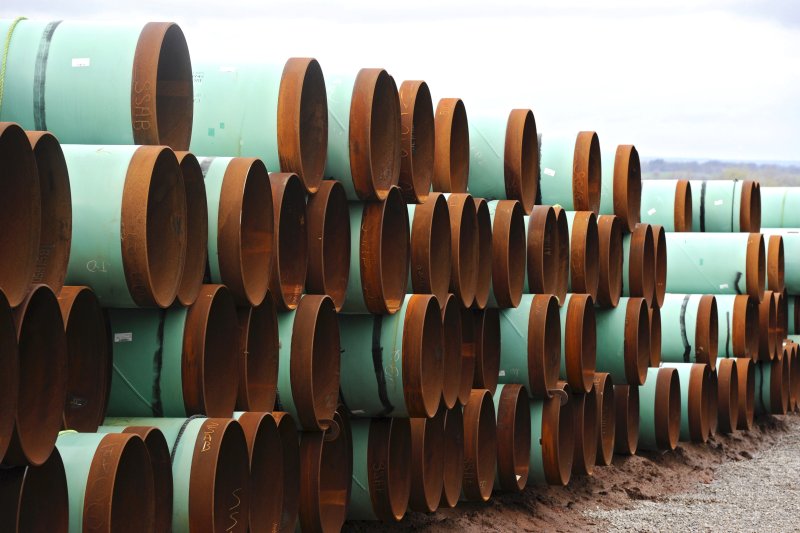1 of 2 | Piping for the Keystone XL pipeline is stacked at a storage yard in the TransCanada Pipe Yard near Cushing, Oklahoma. Photo by Larry W. Smith/EPA
Nov. 9 (UPI) -- The construction of the Keystone XL pipeline has been stopped by a federal judge in Montana -- at least until there's more environmental study on its impact.
The long-running saga of the contentious oil pipeline, which has been the subject of protests and national political debate, took another turn when U.S. District Judge Brian Morris sided with environmental groups late Thursday in its lawsuit against the Trump administration and pipeline builder TransCanada.
Morris' court order said the administration's use of a 2014 environmental review to justify a presidential permit for construction violated three federal laws -- the National Environmental Policy Act, the Endangered Species Act and the Administrative Procedure Act.
The Trump administration gave the go-ahead for the pipeline's construction in March 2017, overruling a decision by former President Barack Obama's government that stalled the project on environmental grounds.
"I would call it a landmark ruling because it overturns a presidential decision purporting to find that a transboundary project is in the public interest," Stephan Volker, an attorney for the plaintiffs, told the Great Falls Tribune.
"And Judge Morris correctly ruled it was not in the public interest because Secretary [of State John] Kerry had found in a detailed ruling several years ago it was not in the public interest."
The pipeline is routed to cross the Milk River, west of Nashua, and the Missouri River. The position is 57 miles upstream from the intake of the Assiniboine and Sioux Rural Water Supply System.
TransCanada said protective measures make the pipeline safe, but the plaintiffs argue in the suit it threatens their water supply and environment.
The pipeline, designed to move 830,000 barrels per day, runs 1,200 miles through Canada and another 875 miles through the United States.
Attorney Fred Jauss, an expert on licensing and permits, told UPI the judge's order could deal "a significant blow" to the Trump administration's energy agenda.
"An appeal of this order will likely go to the 9th Circuit [appellate court], which has not been favorable ground for the Trump administration," he said. "In response, the State Department is likely to take a two-track approach where it will appeal the court's order and simultaneously work on crafting a decision that satisfies the court's findings."
Thursday, the 9th Circuit Court affirmed a lower court ruling that said Trump cannot end the Deferred Action for Childhood Arrivals program, which protects immigrants who arrived in the United States as children, often called "Dreamers."
Jauss said a lengthy appellate process could delay TransCanada's goal of beginning construction next year.
On another pipeline battlefront, the Nebraska Supreme Court heard oral arguments last week from the attorneys from the pipeline's landowners there -- the Ponca Tribe of Nebraska, the Yankton Sioux Tribe and the Sierra Club.
The groups are challenging a ruling from the Nebraska Public Service Commission to grant permission for the pipeline to run through their state.
Advocates have failed to stop the pipeline despite fighting TransCanada on state constitutional challenges, lawsuits against land condemnation and now the public service commission's decision, WOWT-TV reported.















